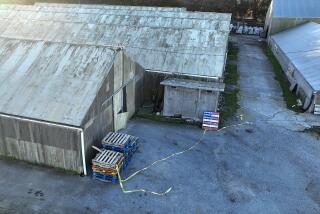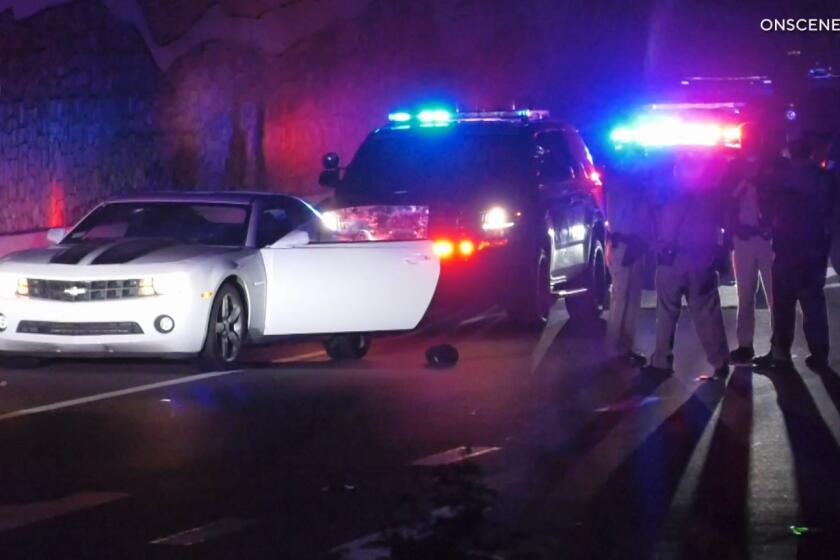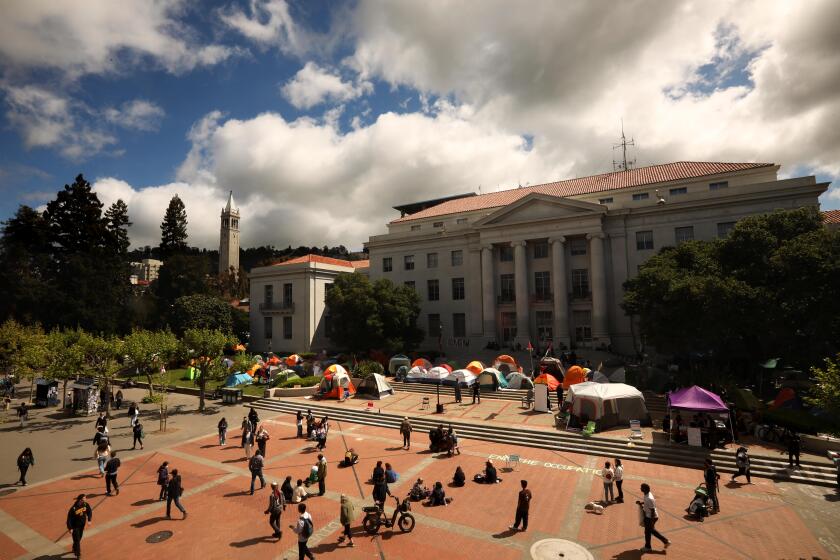Neighbors Try to Scotch New Alcohol Permits : Regulations: New cities such as Mission Viejo are aggressively using zoning to prohibit new outlets. Santa Ana and Garden Grove use the law to revamp areas.
A growing legion of neighborhood activists and local politicians, fed up with the level of alcohol sales, is on the march, putting retailers on the defensive.
In response to claims of a link between concentrations of alcohol sellers and crime and blight, local governments throughout the Southland are trying to make it difficult or impossible for new stores in certain areas to get permits to sell alcoholic beverages.
Sales of some products, such as small bottles of fortified wine or single cans of cold beer, have been prohibited. And many locales will license markets only if they cut off alcohol sales early, hire security guards and clean up graffiti.
Overseeing alcohol sales once was solely the responsibility of the notoriously understaffed Department of Alcoholic Beverage Control. Now, encouraged by state officials, local groups are getting involved by using new local zoning ordinances that govern where--and how--businesses can operate.
Recently incorporated communities such as Mission Viejo, for example, are particularly aggressive in using zoning to limit new alcohol outlets, according to Richard Cottingham, the beverage department’s deputy division chief in Southern California. Established cities as such Santa Ana and Garden Grove, meanwhile, use the ordinances to try to rejuvenate run-down parts of town,
“If we don’t put a line in the sand . . . over these stores, our neighborhood will be gone, and we’ll have to live indoors, and the streets will be given over to the morons,” said Edward M. Riney, who with his Norton Avenue neighbors last fall persuaded the West Hollywood City Council to overturn its decision to allow beer and wine sales at a 7-Eleven near three liquor stores.
Such victories are occurring more frequently. In parts of San Diego, a group led by Cleo Malone, who heads a drug and alcohol treatment agency, is so organized that it has stopped 23 alcohol sellers from getting permits, Malone said.
Retailers, meanwhile, are preparing to fight back in a battle that pits a merchant’s right to sell a legal product against a neighborhood’s right to peace.
Alcohol represents 25% to 35% of the average California convenience store’s annual sales, which are $750,000 to $1 million, according to industry estimates. Lack of a permit usually makes it impossible for a store to stay open, industry officials said.
Merchants argue that stopping alcohol sales at one store makes little sense when the product is widely available and that adding one more alcohol vendor where others already are does not add to community problems.
They also say activists usurp what is properly the responsibility of the state.
“They’re driving . . . the industry nuts doing that,” said Don Beaver, president of the 8,000-member California Grocers Assn. “Local officials don’t know what’s going on, . . . and here they are deciding on someone who is trying to make a living.
“We have an image problem,” he acknowledged. “I’m not saying that there aren’t rotten apples out there that would sell beer to a 12-year-old if they could make a buck, but the vast majority of retailers . . . are honest and hard working.”
Joan Wilson, head of the governmental affairs office of the Southland Corp., which operates 7-Eleven, said: “We’re trying to say we’re the same little old business that’s always been there for you, and alcohol is only one item we sell out of over 3,000.”
Not content to fight skirmishes at often-acrimonious public hearings for operating permits, the grocers association is counterattacking with a public relations campaign dubbed the United Neighborhood Outreach Program. The campaign, which, among other elements, pledges participants not to break the law by selling alcohol to minors, will begin next month in six Northern California counties, Beaver said; if successful, it will be expanded statewide.
Participants will vow to clean up litter, start recycling programs, install bright exterior lights, discourage loitering and instruct clerks not to sell alcohol and tobacco to minors.
But many activists--particularly Ray Chavira, a Los Angeles County deputy probation officer on the board of the Alcohol Policies Project at the Washington-based Center for Science in the Public Interest and former chairman of Americans for Substance Abuse Prevention--look at the campaign with a degree of skepticism.
Chavira argues that retailers are merely trying to avoid having stricter mandatory rules imposed by the government.
The activists deny retailers’ allegations that they are neo-Prohibitionists and say they are merely trying to preserve or improve the quality of neighborhood life.
One of the earliest ordinances requiring alcohol sellers to obtain a conditional use permit resulted from a push in the early 1980s by church groups in South-Central Los Angeles. They were seeking to halt more alcohol sales in their already-saturated neighborhoods. The idea spread to East Los Angeles, Willowbrook and Altadena.
Such efforts encompass upscale enclaves and growing population centers too. Similar movements exist in Santa Monica, Huntington Beach and in such fast-growing suburbs as parts of Riverside and San Bernardino counties. And in Lancaster and Palmdale, activists are pushing for a tough ordinance to control alcohol sales.
Stores selling alcohol must also get state licenses in the estimated one-third of the cities and counties that require local permits. State and local officials agree that local permits can be powerful tools to reduce alcohol sales.
Other hotbeds of local anti-alcohol activism include:
* The Pacoima Coordinating Council and other groups in the northeast San Fernando Valley, which have conducted marches, rallies and other events to build opposition to new alcohol outlets.
* Riverside County, where an ordinance requiring operating permits for new bars, liquor stores and mini-markets went into effect last fall. “Everyone is selling liquor now, including the dairies,” said Rosanna Scott, a senior administrative assistant to Supervisor Melba Dunlap. “We expect it next at the baby-goods store, where you would buy champagne to celebrate the birth of your children.”
* Largely poor southeast San Diego, where in the last four years a Christian group blocked each of 23 requests for new permits by demonstrating how new alcohol outlets would hurt the minority community.
One of the few setbacks to local restrictions occurred last year in Pacoima, where a large number of arrests near three liquor stores caused Los Angeles city officials to impose stringent rules--many of which a judge later threw out.
Attorney Laurence Adelman represented the stores in their successful lawsuit. Since then, he said, he has heard from attorneys in similar fights all over the state. “It is like the old Prohibitionist attitude is being resurrected in the guise of zoning,” he said.
Convenience store owners scored a more recent victory earlier this month in San Diego, where store owner Jo Hardison led a successful effort to gather enough signatures to delay implementation of that city’s recently enacted ban on alcohol on its beaches.
More to Read
Start your day right
Sign up for Essential California for news, features and recommendations from the L.A. Times and beyond in your inbox six days a week.
You may occasionally receive promotional content from the Los Angeles Times.




